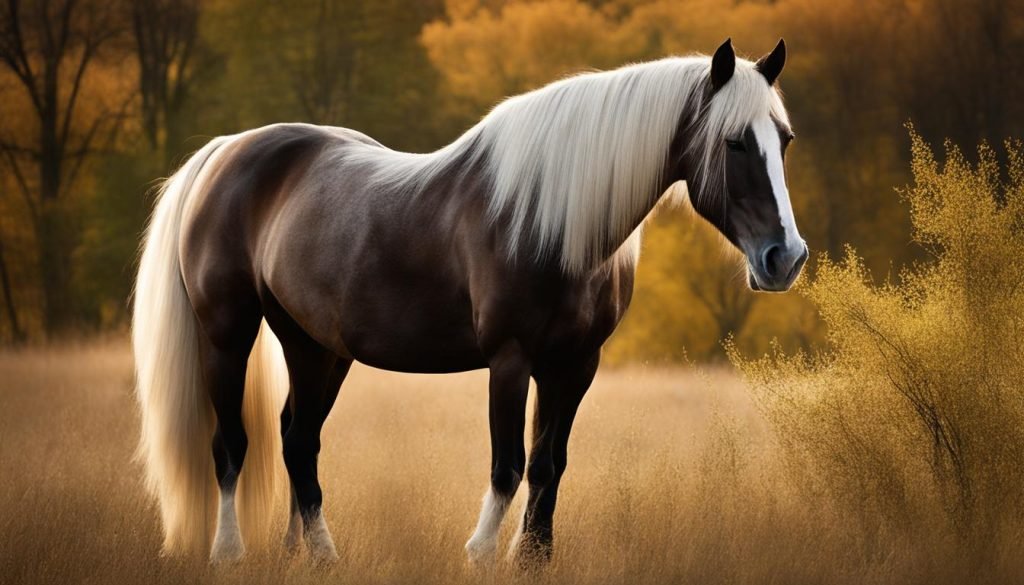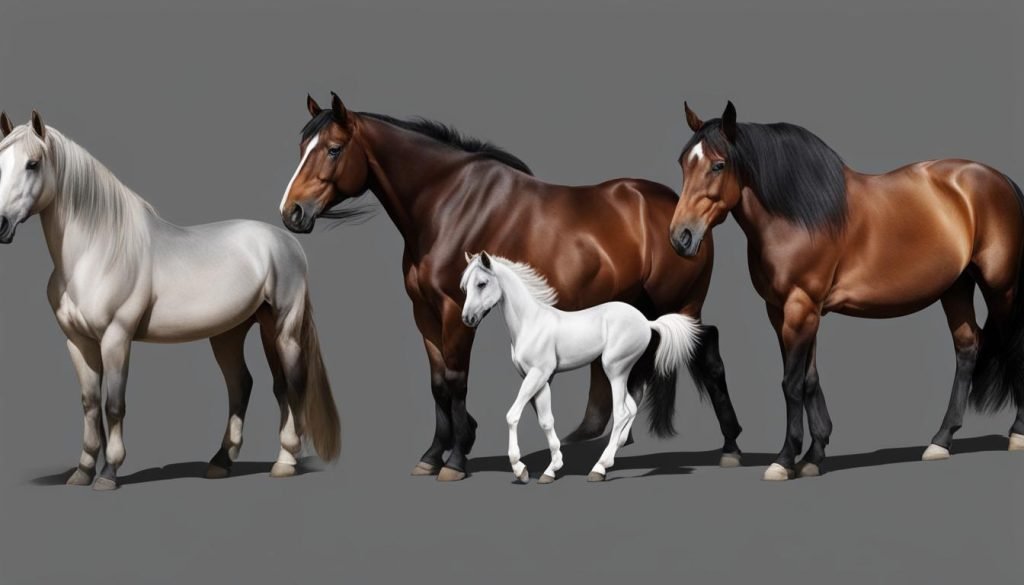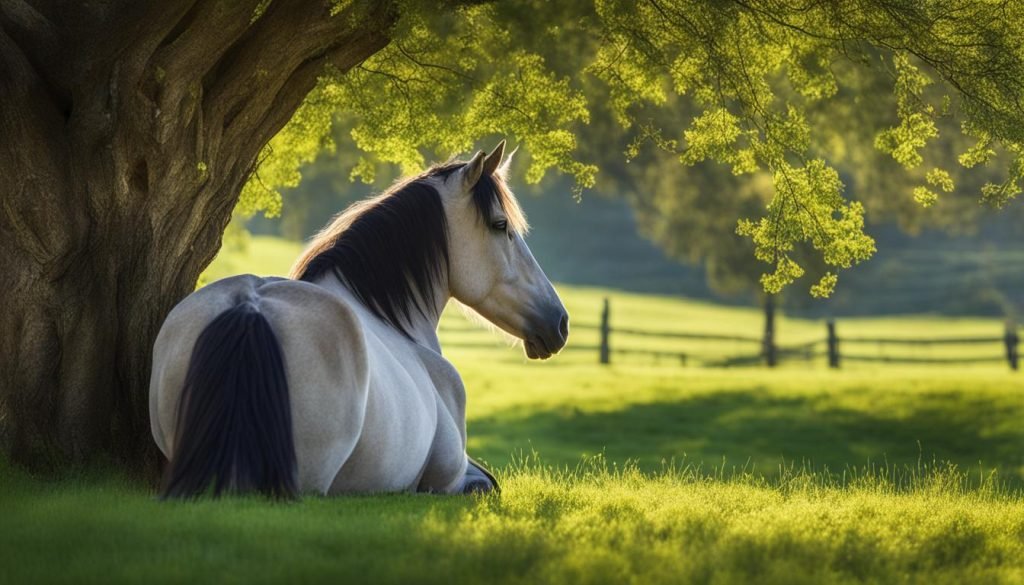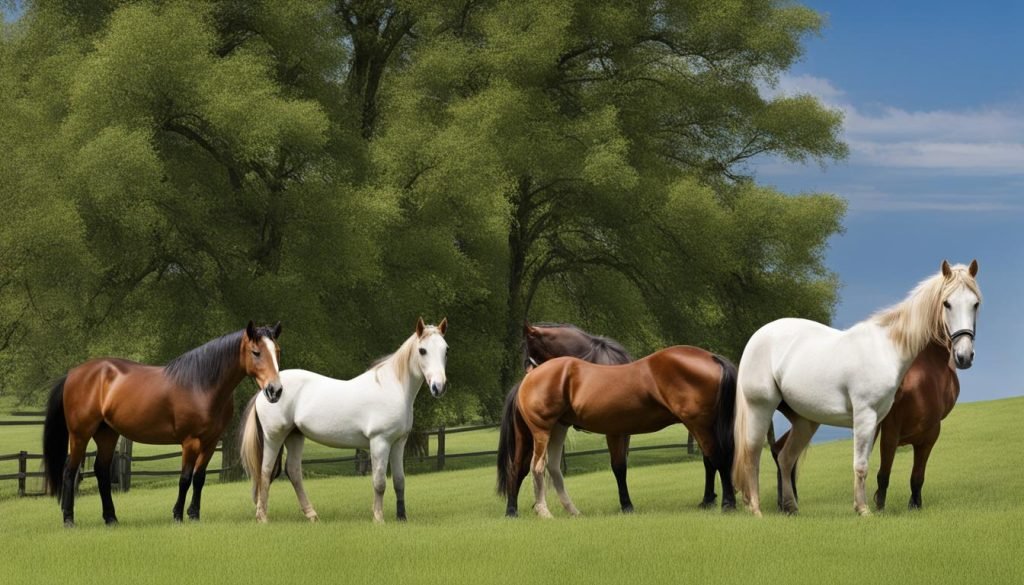How Long Do Horses Live? Equine Longevity
Have you ever wondered how long a horse can live? Equine longevity is a topic that has fascinated horse lovers for centuries. While many factors can influence a horse’s lifespan, understanding the average life expectancy of horses and ways to enhance their life can help maximize their years.
In this article, we will explore the fascinating topic of horse lifespan, from the factors that influence how long horses live to the average lifespan of a horse.
Key Takeaways
- Understanding the factors that affect horse longevity is essential for their overall well-being.
- The average lifespan of a horse can vary based on breed and management practices.
- Managing a horse’s nutrition, exercise, veterinary care, and overall well-being can contribute to their longevity.
- Recognizing the signs of aging in horses and implementing preventive measures can help prolong their lifespan.
- Finally, there are variations in lifespan across different horse breeds, highlighting the importance of breed-specific management practices.
Horse Quiz
How well do you know horses? Test your knowledge below.

Factors Affecting Horse Longevity

Just like humans, horses age too, and several factors can impact their longevity. Let’s take a closer look at what contributes to horse aging and how it affects their life expectancy.
Genetics and Breed
Some horse breeds tend to have longer lifespans than others. For instance, ponies and draft horses often live longer than thoroughbreds and Arabians. Genetics also play a role in how long horses live. If a horse’s parents have a history of certain health issues, their offspring may be more likely to develop them as well. Breeding for specific traits can also have unintended consequences that impact a horse’s health and lifespan.
Environment and Management
The environment a horse lives in can impact their longevity as well. Stabling conditions, pasture access, and exercise routines all play a role in maintaining a horse’s physical and mental well-being. Proper nutrition and healthcare are also necessary for longevity. Poor management practices can lead to health issues that may shorten a horse’s life.
Disease and Injury
Diseases and injuries can be a significant factor in reducing a horse’s lifespan. Horses are prone to several health conditions, including respiratory issues, arthritis, and colic, among others. Prompt veterinary care is crucial to manage these conditions and prevent them from becoming life-threatening. Injuries, especially those involving the legs, can also impact a horse’s longevity if not treated promptly and effectively.
Understanding the factors that contribute to horse aging can help promote an animal’s overall health and longevity.
How Long Do Horses Live: Understanding the Aging Process in Horses

Age-related changes affect horses differently than humans, yet some broad similarities exist in the aging process. Aging in horses is influenced by a combination of factors, including genetics, environment, management, and nutrition.
As horses grow older, their body undergoes several physiological changes that can cause significant effects on their health and welfare.
Physical signs of aging in horses may include greying of the coat, diminished muscle mass, stiff joints, reduced dental function, and the appearance of fatty deposits in the underbelly region. Behavioral changes in horses aged horses can include lethargy, decreased cognitive function, and reduced reaction times.
The severity of these changes varies between individual horses and is often associated with breed differences and other factors. Furthermore, certain predisposing factors, including chronic illnesses and injuries, can accelerate the aging process.
“Correct diagnosis of age-related health issues and timely initiation of treatments can help delay or ease the negative effects of aging in horses.”
The aging process in horses is a complex topic worth exploring. By understanding how aging affects horses and the factors that contribute to it, you can better manage and care for your aging equine companion.
Average Lifespan of a Horse
As with any animal, the lifespan of a horse can vary depending on various factors, including breed, management, and genetics. The average lifespan of a horse can range between 25 to 30 years. However, certain breeds of horses can live significantly longer, with some reaching an age of 40 years or more.
According to research and studies, the following breeds are known for their longer lifespan:
| Breed | Average Lifespan |
|---|---|
| Arabian horse | 30-35 years |
| Appaloosa horse | 30-35 years |
| Thoroughbred horse | 25-30 years |
It is essential to note that like humans, horses may also experience age-related issues as they grow older, and this may impact their longevity. However, with proper care and management, horse owners can enhance their horse’s lifespan and overall well-being.
Factors for Enhancing Horse Longevity

There are several ways you can enhance a horse’s lifespan. Nutrition, exercise, veterinary care, and overall management all play integral roles in equine longevity. Here are some factors that can contribute to a horse’s long and healthy life:
- Nutrition: Providing balanced and appropriate nutrition is vital for a horse’s health. Ensuring they have access to clean water, good-quality forage, and the appropriate amount of concentrated feed is essential. Consult with your veterinarian or equine nutritionist for a customized feeding plan that caters to the horse’s age, activity level, and overall health.
- Exercise: Regular exercise is important for maintaining a horse’s physical and mental health. It helps keep their muscles and joints limber, aids in digestion, and can prevent obesity. Exercise should be tailored to the horse’s ability and fitness level, gradually increasing in intensity and duration.
- Veterinary Care: Routine veterinary check-ups are critical for early detection and management of any health issues. Annual vaccinations, dental exams, and parasite control can help keep your horse in good health. Regular monitoring of their body condition score, heart rate, and respiration rate can also help identify any potential health concerns.
- Overall Management: Proper management practices are important for the overall well-being of your horse. Keep their environment clean, safe, and comfortable, providing appropriate shelter and turnout. Regular grooming and hoof care can also help maintain their health and prevent any potential issues.
To maximize your horse’s lifespan, it’s important to implement these factors into their daily care and management. By providing proper nutrition, exercise, veterinary care, and overall management, you can help your horse lead a long and healthy life.
Longevity Variations Across Breeds
When it comes to equine lifespan, the breed does play a role. While horses generally live between 25 and 30 years, there are variations between breeds. Some breeds are known for their longevity, while others have shorter lifespans.
| Breed | Average Lifespan |
|---|---|
| Thoroughbred | 25 years |
| Arabian | 30 years |
| Quarter Horse | 30 years |
| Pony of the Americas | 35 years |
As shown in the table, larger horses such as Thoroughbreds typically have shorter lifespans, while smaller breeds such as Pony of the Americas typically live longer. However, it’s important to note that with proper care and management, any horse can potentially live a long and healthy life.
Genetics also plays a significant role in the equine lifespan. Some breeds are prone to age-related diseases or genetic conditions that can impact their longevity. For example, Arabians are known for their strong, resilient bones and joints, while Draft breeds are prone to arthritis and other joint problems as they age.
Ultimately, the lifespan of a horse is influenced by a variety of factors, including genetics, size, breed, and management practices. With proper care and attention, horse owners can help their equine companions live long, healthy lives.
Recognizing Signs of Aging in Horses

As horses age, they go through numerous physical and physiological changes. It’s essential to recognize these changes as early as possible to provide appropriate management and ensure that any age-related conditions are addressed promptly. Here are the signs of aging that horse owners should look out for:
- Gray hairs around the eyes, muzzle, and ears
- Decreased muscle mass and tone, leading to a sink in overall body profile.
- Thinning of skin and loss of elasticity
- Joint stiffness and decreased mobility
- Decreased activity level and energy
- Loss of tooth function, causing the horse to struggle with digesting roughage
Horse owners should also look out for behavioral changes, such as lethargy or increased irritability, as these may be indicative of the onset of age-related conditions. Regular veterinary checkups are essential for older horses and may help identify issues early on. Early recognition and management are key to ensuring that horses continue to enjoy a good quality of life in their later years.
“With each passing year a horse gains wisdom, authority, and gentleness. So much to learn as well as to teach.”
Longevity Tips for Horse Owners
As a horse owner, you play a crucial role in determining the lifespan of your equine companion. Here are some practical tips to help you enhance your horse’s longevity:
1. Implement a Healthy Diet: A well-balanced diet that meets your horse’s nutritional requirements is essential for their overall health and longevity. Consult with your veterinarian to determine the best diet for your horse.
2. Exercise Regularly: Regular exercise can help maintain your horse’s physical and mental well-being, promoting a longer lifespan. Incorporate moderate exercise into your horse’s daily routine.
3. Schedule Regular Veterinary Check-ups: Regular check-ups can help detect health issues early on, allowing for prompt treatment and better outcomes. Make sure your horse receives routine veterinary care, including vaccinations and dental exams.
4. Provide a Safe Environment: Create a safe and comfortable environment for your horse to reduce the risk of injury or illness. Ensure your horse has access to clean water, adequate shelter, and appropriate fencing.
5. Manage Stress: Manage stress factors that can negatively impact your horse’s lifespan, such as overcrowding or overworking. Provide your horse with ample rest to reduce stress levels.
6. Address Health Issues Promptly: Address any health issues promptly to prevent complications that can reduce your horse’s lifespan. Recognize the signs of illness or injury and seek veterinary care immediately.
By implementing these longevity tips, you can help promote a long and healthy life for your equine companion. Remember to consult with your veterinarian to ensure your horse’s individual needs are being met.







